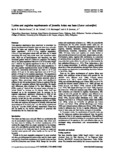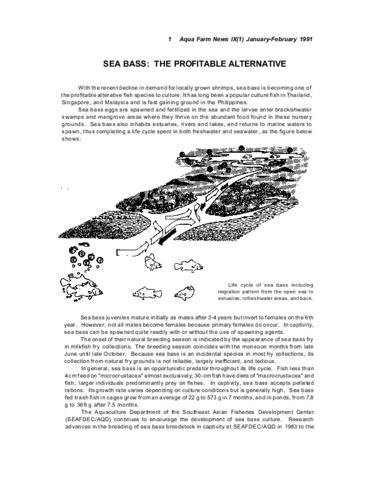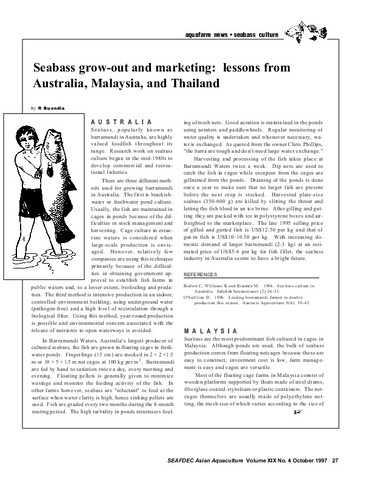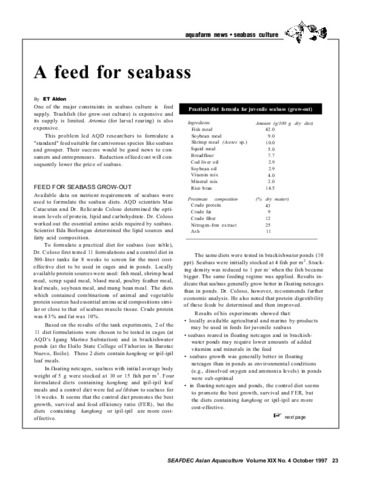Lysine and arginine requirements of juvenile Asian sea bass (Lates calcarifer)
- Global styles
- MLA
- Vancouver
- Elsevier - Harvard
- APA
- Help

View/
Date
2001Page views
1,944ASFA keyword
AGROVOC keyword
Taxonomic term
Metadata
Show full item record
Share
Abstract
Two separate experiments were conducted to determine the dietary requirements of juvenile Asian sea bass Lates calcarifer Bloch for lysine and arginine. Fish (average initial weight: lysine experiment, 13.12 ± 0.12 g; arginine experiment, 2.56 ± 0.13 g) were given amino acid test diets for 12 weeks containing fish meal, zein, squid meal, and crystalline amino acids. Each set of isonitrogenous and isocaloric test diets contained graded levels of L-lysine or L-arginine. The feeding rate in the lysine experiment was at 4–2.5% of the body weight day−1, while in the arginine experiment it was at 10–4% of the body weight day−1. The fish (20 per tank, lysine experiment; 15 per tank, arginine experiment) were reared in 500-L fibreglass tanks with continuous flowthrough sea water at 27 °C and salinity of 31 ppt in the lysine experiment and at 29 °C and salinity of 29 ppt in the arginine experiment. The experiments were in a completely randomized design with two replicates per treatment. Survival was high in fish given adequate lysine or arginine. Mean percentage weight gains were significantly different in fish fed varying levels of lysine or arginine. Fish fed high levels of L-arginine suffered high mortalities. No significant differences were obtained in the feed efficiency ratios (FER, g gain g−1 feed) of fish fed graded lysine, although the values tended to increase as the dietary lysine level was increased up to the requirement level. In contrast, in the arginine experiment, significant differences in FER of fish among treatments were obtained; the highest FER was observed in fish fed the diet containing an optimum arginine level. On the basis of the growth response, survival, and FER, the lysine and arginine requirements of juvenile Asian sea bass were estimated to be 20.6 g kg−1 dry diet (4.5% protein) and 18.2 g kg−1 dry diet (3.8% protein), respectively. These data will be useful in the further refinement of practical diet formulations for the Asian sea bass.
Suggested Citation
Murillo-Gurrea, D. P., Coloso, R. M., Borlongan, I. G., & Serrano, A. E., Jr. (2001). Lysine and arginine requirements of juvenile Asian sea bass (Lates calcarifer). Journal of Applied Ichthyology , 17(2), 49-53. https://doi.org/10.1046/j.1439-0426.2001.00242.x
Type
ArticleISSN
0175-8659Collections
- Journal Articles [1262]
Related items
Showing items related by title, author, creator and subject.
-
Sea bass: The profitable alternative
Southeast Asian Fisheries Development Center, Aquaculture Department (Aquaculture Department, Southeast Asian Fisheries Development Center, 1991) -
Seabass grow-out and marketing: lessons from Australia, Malaysia, and Thailand
Buendia, Romeo (Aquaculture Department, Southeast Asian Fisheries Development Center, 1997) -
A feed for seabass
Aldon, E. T. (Aquaculture Department, Southeast Asian Fisheries Development Center, 1997)One of the major constraints in seabass (Lates calcarifer) culture is feed supply. Details are given of work conducted at AQD regarding the formulation of a 'standard' feed suitable for carnivorous species like the seabass ...





